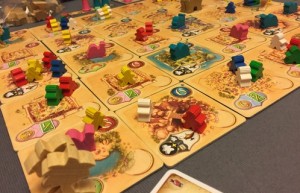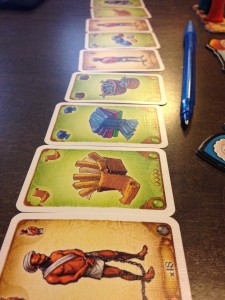 This week’s Monday Night Gaming: Five Tribes.
This week’s Monday Night Gaming: Five Tribes.
Five Tribes is a simple, yet complex game that we played with our friend Will. After a rousing game of Discworld: Ankh-Morpork, we needed something simple to finish up our weekend visit to Cafe Mox/Mox Boarding House. The folks in the Card Kingdom side of Mox recommended Five Tribes as a game that would be easy to learn and quick to play.
While I greatly enjoyed this game, playing against two programmers who are well-versed in algorithms (much more than me anyway), gave me absolutely no chance to win. They were able to think of paths and options far ahead of the simple steps I was using. Whereas my imagination and creativity crushed them at Dixit, their logic and problem solving skills crushed me at Five Tribes.
# of Players: 2-4 Players
General Mechanics: The board is set up with meeples already in place on the board with randomized resource tiles beneath them. Players take turns moving meeples across oases, markets, villages, and other resource tiles, but movement is limited by certain rules:
- You cannot land on an empty tile
- You cannot move diagonal
- You cannot backtrack
- Your meeple must land on a tile with a meeple of the same color
[important]Example: You pick up a group of 5 meeples and move, dropping one meeple per tile as you go. If your last meeple is red, you must land on a non-empty tile containing a red meeple. [/important]
 Where you land determines different outcomes for the game as your meeples consist of assassins, elders, builders, merchants, and viziers. Each one has different powers. For example, assassins allow you to “assassinate” another player’s elder or viziers. Both of those get used to purchase differed powered Djinn, so killing off your opponent’s is a great strategy. If a player lands on a tile with meeples consisting of only one color, they can claim that tile with their camel.
Where you land determines different outcomes for the game as your meeples consist of assassins, elders, builders, merchants, and viziers. Each one has different powers. For example, assassins allow you to “assassinate” another player’s elder or viziers. Both of those get used to purchase differed powered Djinn, so killing off your opponent’s is a great strategy. If a player lands on a tile with meeples consisting of only one color, they can claim that tile with their camel.
Claimed tiles give the player a certain number of victory points based on the points on the tile and the number of palm trees or palaces are on them. Djinn can often grant powers like allowing a player to land in an empty square or giving players palm trees and palaces, etc. Being able to outsmart your opponent is crucial.
How to Win/Lose: Gain the most victory points to win. Lose by having the least. Fairly straight forward.
What I Liked: I loved how much this game forced me to think. I’m not a logical thinker in terms of programming, but this required me to think like one. It was fun to stretch my brain like that.
What I Didn’t Like: Playing against two people who could out-program me while typing with their toes, especially my husband, the algorithms expert. Also, to fit with the time period and theme of the game, there are slaves you purchase and sacrifice to gain Djinn. Not so big on the slavery aspect. :/
Overall Rating/Impression:
This is an entertaining game that is easy to learn and quick to play, just as promised, yet it leaves room for replay. Because there is no one way to win and the meeples and tiles are different every time, you could replay this and learn quite a bit of logic while doing so. Overall, I give it a 7/10.
Read the rest of the Monday Night Gaming series by clicking here.

